Analyzing Fundamentals of Medical Orders: Documentation & Impact
VerifiedAdded on 2023/06/11
|5
|1724
|410
Report
AI Summary
This report examines the critical aspects of medical orders, focusing on the impact of errors and the significance of proper documentation in healthcare settings. It highlights a scenario where a nurse's failure to adhere to NPO guidelines before a colonoscopy endangered a patient, emphasizing the importance of accurate record-keeping by the Hospital Unit Clerk (HUC). The report details the wide-ranging effects of poor documentation on patients, nursing staff, and the HUC, including compromised patient safety, potential legal repercussions, and damaged professional reputations. Furthermore, it explores the criteria for an HUC's fitness to practice, drawing from the College & Association of Registered Nurses of Alberta's standards. The analysis underscores the necessity for regulating HUCs to ensure quality care and reflects on the insightful lessons learned regarding the central role of thorough documentation in healthcare provision, asserting that registered nurses must demonstrate fitness to guarantee patient safety.
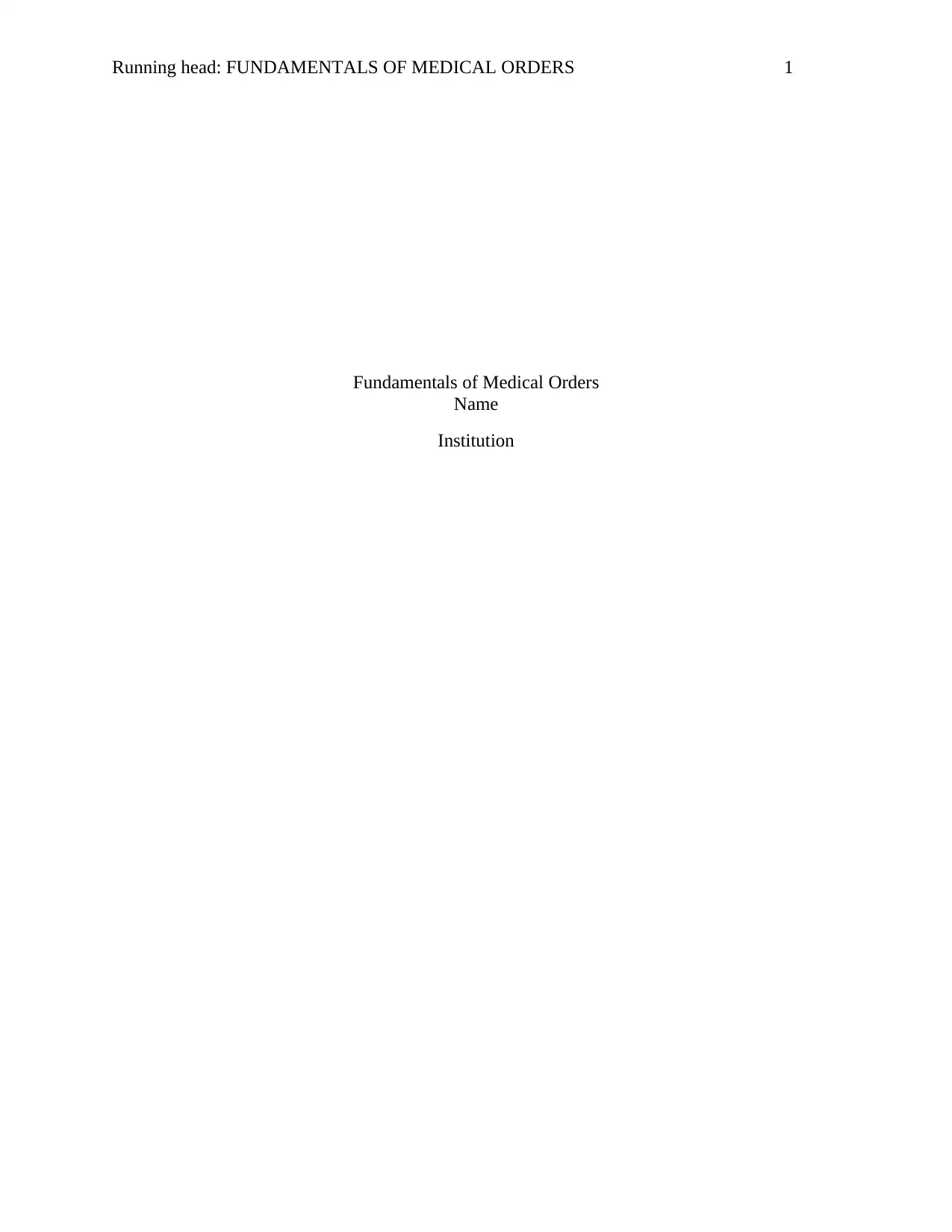
Running head: FUNDAMENTALS OF MEDICAL ORDERS 1
Fundamentals of Medical Orders
Name
Institution
Fundamentals of Medical Orders
Name
Institution
Paraphrase This Document
Need a fresh take? Get an instant paraphrase of this document with our AI Paraphraser
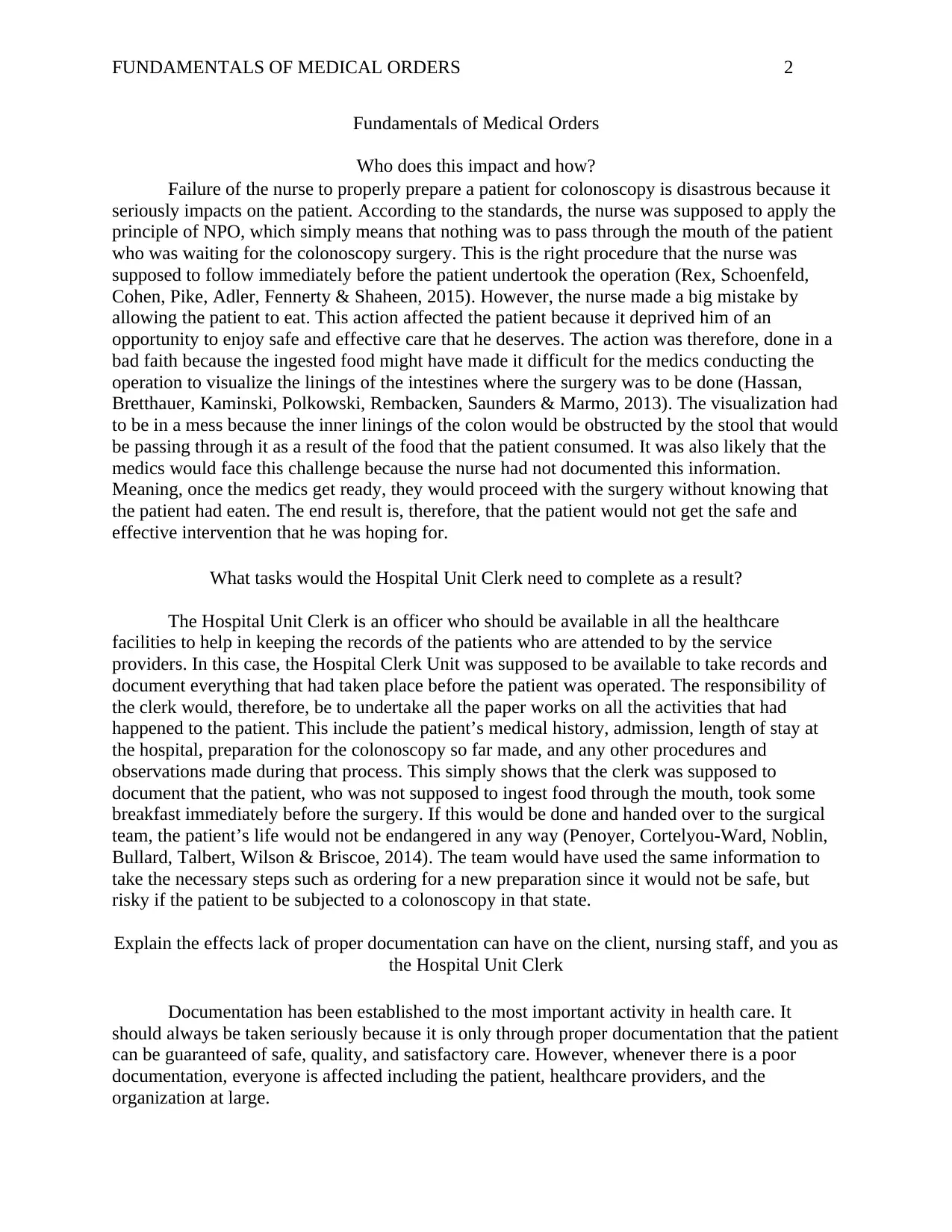
FUNDAMENTALS OF MEDICAL ORDERS 2
Fundamentals of Medical Orders
Who does this impact and how?
Failure of the nurse to properly prepare a patient for colonoscopy is disastrous because it
seriously impacts on the patient. According to the standards, the nurse was supposed to apply the
principle of NPO, which simply means that nothing was to pass through the mouth of the patient
who was waiting for the colonoscopy surgery. This is the right procedure that the nurse was
supposed to follow immediately before the patient undertook the operation (Rex, Schoenfeld,
Cohen, Pike, Adler, Fennerty & Shaheen, 2015). However, the nurse made a big mistake by
allowing the patient to eat. This action affected the patient because it deprived him of an
opportunity to enjoy safe and effective care that he deserves. The action was therefore, done in a
bad faith because the ingested food might have made it difficult for the medics conducting the
operation to visualize the linings of the intestines where the surgery was to be done (Hassan,
Bretthauer, Kaminski, Polkowski, Rembacken, Saunders & Marmo, 2013). The visualization had
to be in a mess because the inner linings of the colon would be obstructed by the stool that would
be passing through it as a result of the food that the patient consumed. It was also likely that the
medics would face this challenge because the nurse had not documented this information.
Meaning, once the medics get ready, they would proceed with the surgery without knowing that
the patient had eaten. The end result is, therefore, that the patient would not get the safe and
effective intervention that he was hoping for.
What tasks would the Hospital Unit Clerk need to complete as a result?
The Hospital Unit Clerk is an officer who should be available in all the healthcare
facilities to help in keeping the records of the patients who are attended to by the service
providers. In this case, the Hospital Clerk Unit was supposed to be available to take records and
document everything that had taken place before the patient was operated. The responsibility of
the clerk would, therefore, be to undertake all the paper works on all the activities that had
happened to the patient. This include the patient’s medical history, admission, length of stay at
the hospital, preparation for the colonoscopy so far made, and any other procedures and
observations made during that process. This simply shows that the clerk was supposed to
document that the patient, who was not supposed to ingest food through the mouth, took some
breakfast immediately before the surgery. If this would be done and handed over to the surgical
team, the patient’s life would not be endangered in any way (Penoyer, Cortelyou-Ward, Noblin,
Bullard, Talbert, Wilson & Briscoe, 2014). The team would have used the same information to
take the necessary steps such as ordering for a new preparation since it would not be safe, but
risky if the patient to be subjected to a colonoscopy in that state.
Explain the effects lack of proper documentation can have on the client, nursing staff, and you as
the Hospital Unit Clerk
Documentation has been established to the most important activity in health care. It
should always be taken seriously because it is only through proper documentation that the patient
can be guaranteed of safe, quality, and satisfactory care. However, whenever there is a poor
documentation, everyone is affected including the patient, healthcare providers, and the
organization at large.
Fundamentals of Medical Orders
Who does this impact and how?
Failure of the nurse to properly prepare a patient for colonoscopy is disastrous because it
seriously impacts on the patient. According to the standards, the nurse was supposed to apply the
principle of NPO, which simply means that nothing was to pass through the mouth of the patient
who was waiting for the colonoscopy surgery. This is the right procedure that the nurse was
supposed to follow immediately before the patient undertook the operation (Rex, Schoenfeld,
Cohen, Pike, Adler, Fennerty & Shaheen, 2015). However, the nurse made a big mistake by
allowing the patient to eat. This action affected the patient because it deprived him of an
opportunity to enjoy safe and effective care that he deserves. The action was therefore, done in a
bad faith because the ingested food might have made it difficult for the medics conducting the
operation to visualize the linings of the intestines where the surgery was to be done (Hassan,
Bretthauer, Kaminski, Polkowski, Rembacken, Saunders & Marmo, 2013). The visualization had
to be in a mess because the inner linings of the colon would be obstructed by the stool that would
be passing through it as a result of the food that the patient consumed. It was also likely that the
medics would face this challenge because the nurse had not documented this information.
Meaning, once the medics get ready, they would proceed with the surgery without knowing that
the patient had eaten. The end result is, therefore, that the patient would not get the safe and
effective intervention that he was hoping for.
What tasks would the Hospital Unit Clerk need to complete as a result?
The Hospital Unit Clerk is an officer who should be available in all the healthcare
facilities to help in keeping the records of the patients who are attended to by the service
providers. In this case, the Hospital Clerk Unit was supposed to be available to take records and
document everything that had taken place before the patient was operated. The responsibility of
the clerk would, therefore, be to undertake all the paper works on all the activities that had
happened to the patient. This include the patient’s medical history, admission, length of stay at
the hospital, preparation for the colonoscopy so far made, and any other procedures and
observations made during that process. This simply shows that the clerk was supposed to
document that the patient, who was not supposed to ingest food through the mouth, took some
breakfast immediately before the surgery. If this would be done and handed over to the surgical
team, the patient’s life would not be endangered in any way (Penoyer, Cortelyou-Ward, Noblin,
Bullard, Talbert, Wilson & Briscoe, 2014). The team would have used the same information to
take the necessary steps such as ordering for a new preparation since it would not be safe, but
risky if the patient to be subjected to a colonoscopy in that state.
Explain the effects lack of proper documentation can have on the client, nursing staff, and you as
the Hospital Unit Clerk
Documentation has been established to the most important activity in health care. It
should always be taken seriously because it is only through proper documentation that the patient
can be guaranteed of safe, quality, and satisfactory care. However, whenever there is a poor
documentation, everyone is affected including the patient, healthcare providers, and the
organization at large.
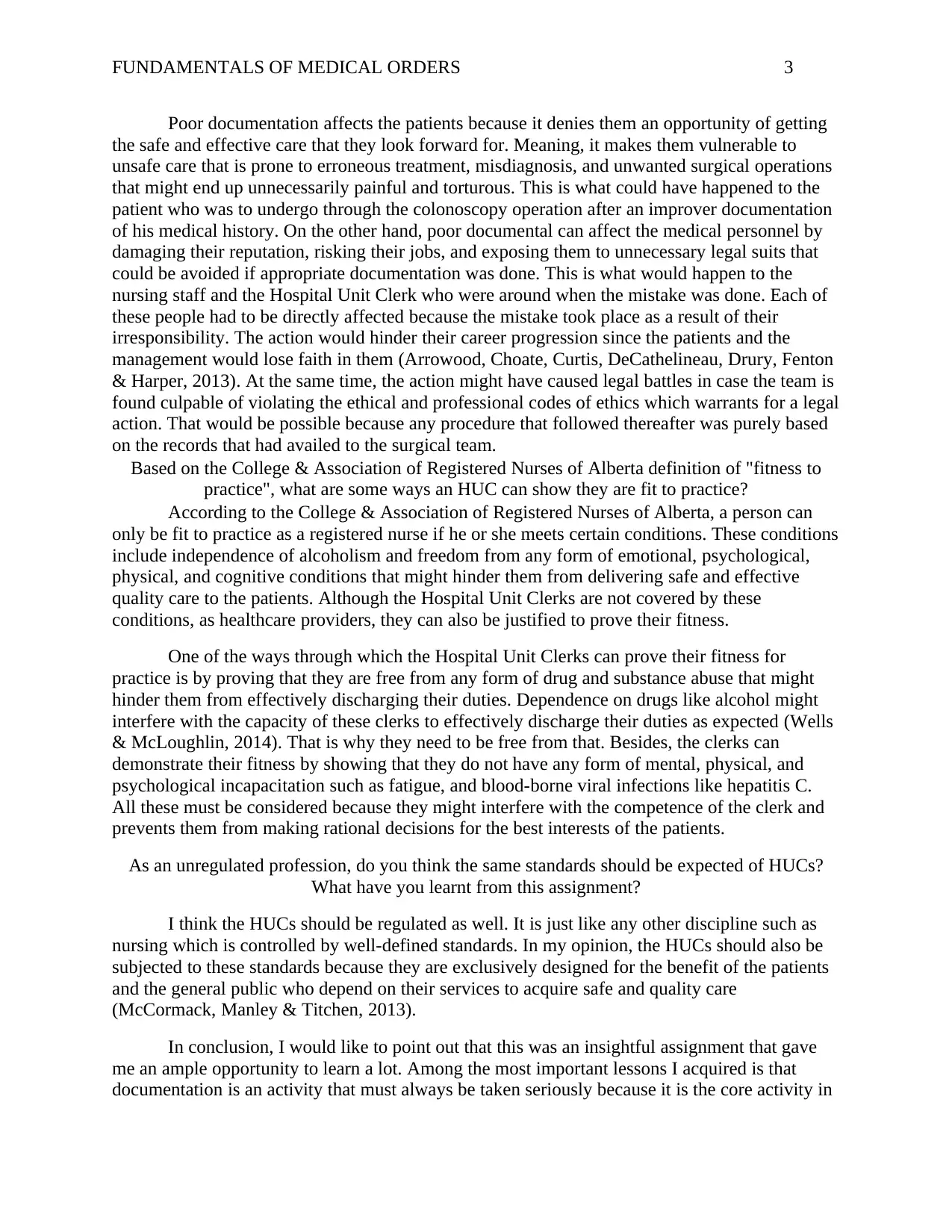
FUNDAMENTALS OF MEDICAL ORDERS 3
Poor documentation affects the patients because it denies them an opportunity of getting
the safe and effective care that they look forward for. Meaning, it makes them vulnerable to
unsafe care that is prone to erroneous treatment, misdiagnosis, and unwanted surgical operations
that might end up unnecessarily painful and torturous. This is what could have happened to the
patient who was to undergo through the colonoscopy operation after an improver documentation
of his medical history. On the other hand, poor documental can affect the medical personnel by
damaging their reputation, risking their jobs, and exposing them to unnecessary legal suits that
could be avoided if appropriate documentation was done. This is what would happen to the
nursing staff and the Hospital Unit Clerk who were around when the mistake was done. Each of
these people had to be directly affected because the mistake took place as a result of their
irresponsibility. The action would hinder their career progression since the patients and the
management would lose faith in them (Arrowood, Choate, Curtis, DeCathelineau, Drury, Fenton
& Harper, 2013). At the same time, the action might have caused legal battles in case the team is
found culpable of violating the ethical and professional codes of ethics which warrants for a legal
action. That would be possible because any procedure that followed thereafter was purely based
on the records that had availed to the surgical team.
Based on the College & Association of Registered Nurses of Alberta definition of "fitness to
practice", what are some ways an HUC can show they are fit to practice?
According to the College & Association of Registered Nurses of Alberta, a person can
only be fit to practice as a registered nurse if he or she meets certain conditions. These conditions
include independence of alcoholism and freedom from any form of emotional, psychological,
physical, and cognitive conditions that might hinder them from delivering safe and effective
quality care to the patients. Although the Hospital Unit Clerks are not covered by these
conditions, as healthcare providers, they can also be justified to prove their fitness.
One of the ways through which the Hospital Unit Clerks can prove their fitness for
practice is by proving that they are free from any form of drug and substance abuse that might
hinder them from effectively discharging their duties. Dependence on drugs like alcohol might
interfere with the capacity of these clerks to effectively discharge their duties as expected (Wells
& McLoughlin, 2014). That is why they need to be free from that. Besides, the clerks can
demonstrate their fitness by showing that they do not have any form of mental, physical, and
psychological incapacitation such as fatigue, and blood-borne viral infections like hepatitis C.
All these must be considered because they might interfere with the competence of the clerk and
prevents them from making rational decisions for the best interests of the patients.
As an unregulated profession, do you think the same standards should be expected of HUCs?
What have you learnt from this assignment?
I think the HUCs should be regulated as well. It is just like any other discipline such as
nursing which is controlled by well-defined standards. In my opinion, the HUCs should also be
subjected to these standards because they are exclusively designed for the benefit of the patients
and the general public who depend on their services to acquire safe and quality care
(McCormack, Manley & Titchen, 2013).
In conclusion, I would like to point out that this was an insightful assignment that gave
me an ample opportunity to learn a lot. Among the most important lessons I acquired is that
documentation is an activity that must always be taken seriously because it is the core activity in
Poor documentation affects the patients because it denies them an opportunity of getting
the safe and effective care that they look forward for. Meaning, it makes them vulnerable to
unsafe care that is prone to erroneous treatment, misdiagnosis, and unwanted surgical operations
that might end up unnecessarily painful and torturous. This is what could have happened to the
patient who was to undergo through the colonoscopy operation after an improver documentation
of his medical history. On the other hand, poor documental can affect the medical personnel by
damaging their reputation, risking their jobs, and exposing them to unnecessary legal suits that
could be avoided if appropriate documentation was done. This is what would happen to the
nursing staff and the Hospital Unit Clerk who were around when the mistake was done. Each of
these people had to be directly affected because the mistake took place as a result of their
irresponsibility. The action would hinder their career progression since the patients and the
management would lose faith in them (Arrowood, Choate, Curtis, DeCathelineau, Drury, Fenton
& Harper, 2013). At the same time, the action might have caused legal battles in case the team is
found culpable of violating the ethical and professional codes of ethics which warrants for a legal
action. That would be possible because any procedure that followed thereafter was purely based
on the records that had availed to the surgical team.
Based on the College & Association of Registered Nurses of Alberta definition of "fitness to
practice", what are some ways an HUC can show they are fit to practice?
According to the College & Association of Registered Nurses of Alberta, a person can
only be fit to practice as a registered nurse if he or she meets certain conditions. These conditions
include independence of alcoholism and freedom from any form of emotional, psychological,
physical, and cognitive conditions that might hinder them from delivering safe and effective
quality care to the patients. Although the Hospital Unit Clerks are not covered by these
conditions, as healthcare providers, they can also be justified to prove their fitness.
One of the ways through which the Hospital Unit Clerks can prove their fitness for
practice is by proving that they are free from any form of drug and substance abuse that might
hinder them from effectively discharging their duties. Dependence on drugs like alcohol might
interfere with the capacity of these clerks to effectively discharge their duties as expected (Wells
& McLoughlin, 2014). That is why they need to be free from that. Besides, the clerks can
demonstrate their fitness by showing that they do not have any form of mental, physical, and
psychological incapacitation such as fatigue, and blood-borne viral infections like hepatitis C.
All these must be considered because they might interfere with the competence of the clerk and
prevents them from making rational decisions for the best interests of the patients.
As an unregulated profession, do you think the same standards should be expected of HUCs?
What have you learnt from this assignment?
I think the HUCs should be regulated as well. It is just like any other discipline such as
nursing which is controlled by well-defined standards. In my opinion, the HUCs should also be
subjected to these standards because they are exclusively designed for the benefit of the patients
and the general public who depend on their services to acquire safe and quality care
(McCormack, Manley & Titchen, 2013).
In conclusion, I would like to point out that this was an insightful assignment that gave
me an ample opportunity to learn a lot. Among the most important lessons I acquired is that
documentation is an activity that must always be taken seriously because it is the core activity in
⊘ This is a preview!⊘
Do you want full access?
Subscribe today to unlock all pages.

Trusted by 1+ million students worldwide
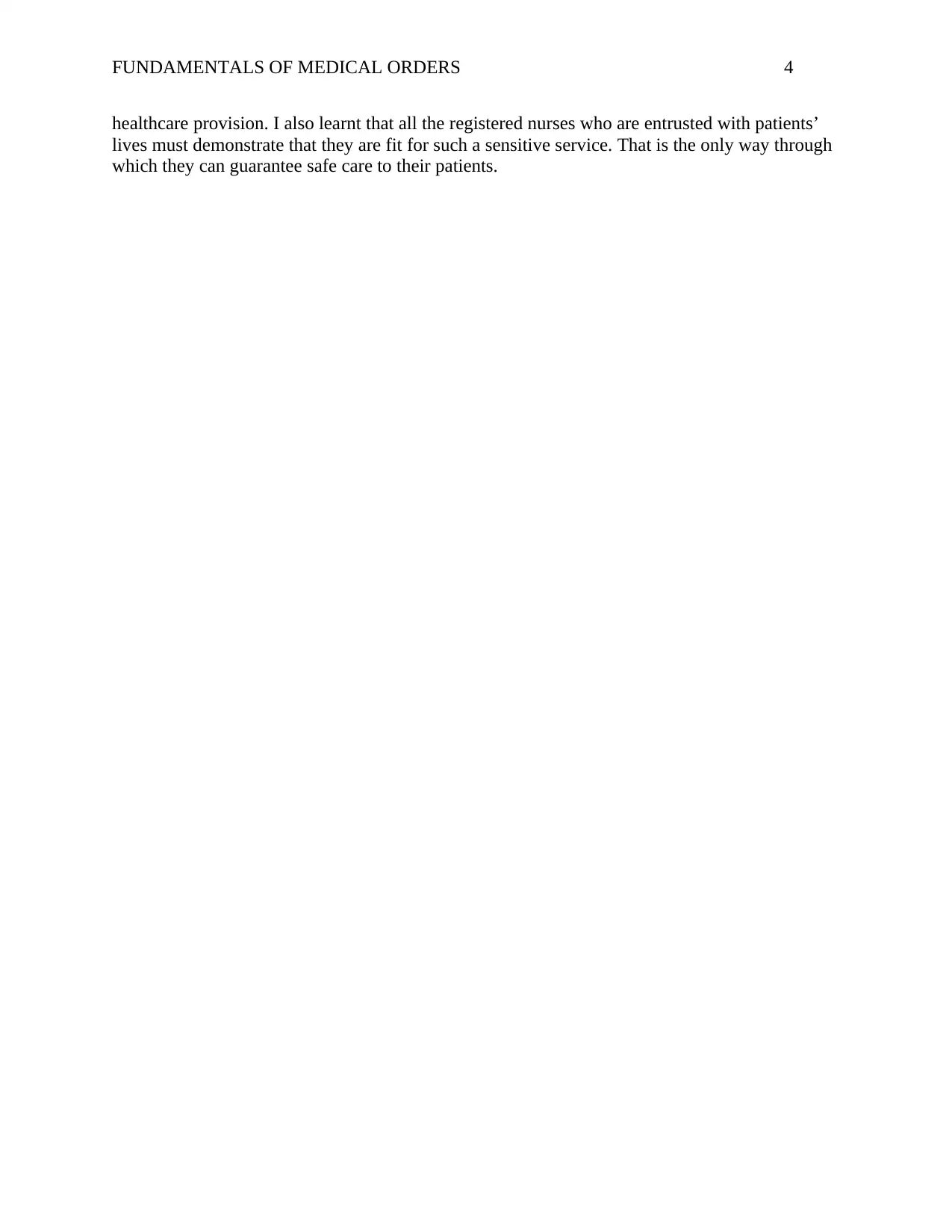
FUNDAMENTALS OF MEDICAL ORDERS 4
healthcare provision. I also learnt that all the registered nurses who are entrusted with patients’
lives must demonstrate that they are fit for such a sensitive service. That is the only way through
which they can guarantee safe care to their patients.
healthcare provision. I also learnt that all the registered nurses who are entrusted with patients’
lives must demonstrate that they are fit for such a sensitive service. That is the only way through
which they can guarantee safe care to their patients.
Paraphrase This Document
Need a fresh take? Get an instant paraphrase of this document with our AI Paraphraser
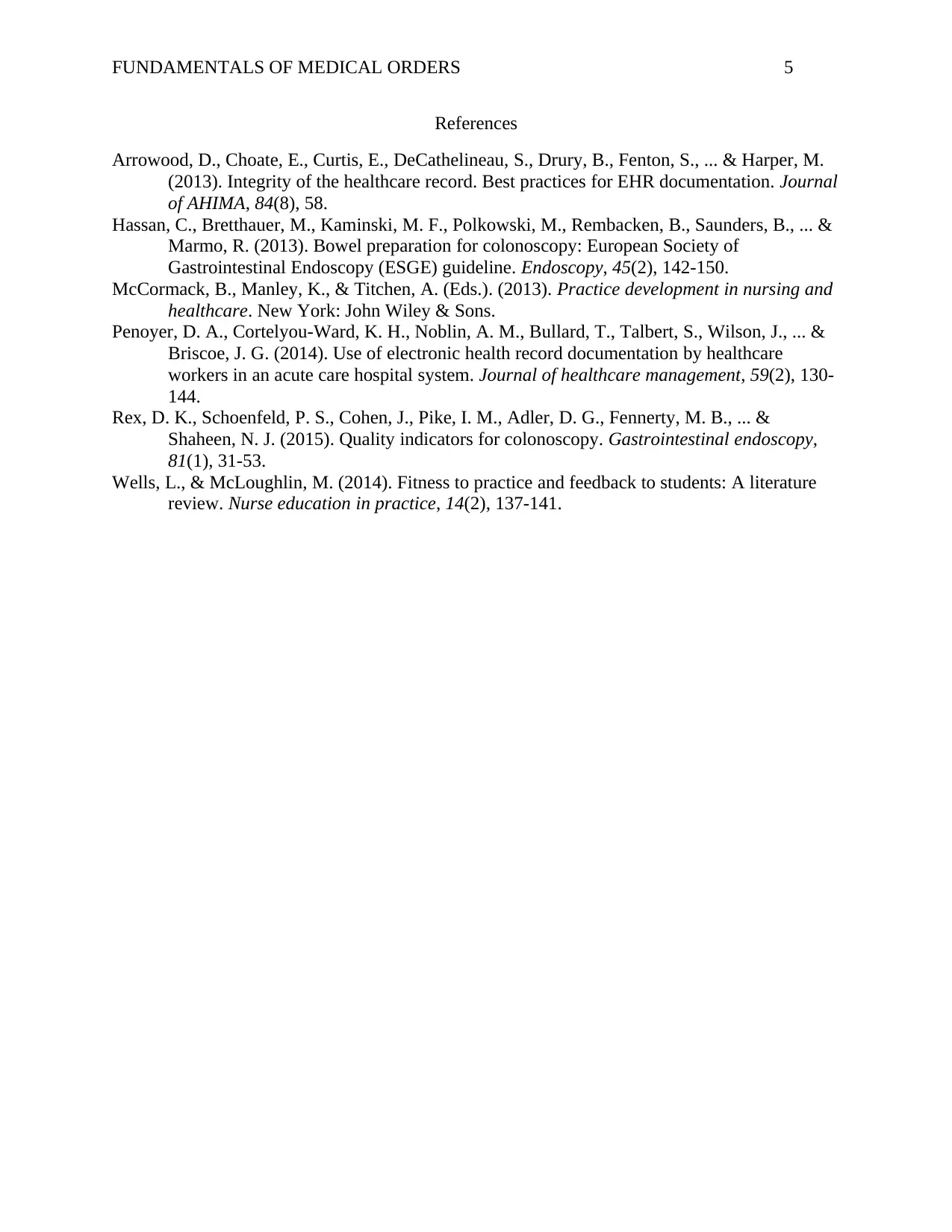
FUNDAMENTALS OF MEDICAL ORDERS 5
References
Arrowood, D., Choate, E., Curtis, E., DeCathelineau, S., Drury, B., Fenton, S., ... & Harper, M.
(2013). Integrity of the healthcare record. Best practices for EHR documentation. Journal
of AHIMA, 84(8), 58.
Hassan, C., Bretthauer, M., Kaminski, M. F., Polkowski, M., Rembacken, B., Saunders, B., ... &
Marmo, R. (2013). Bowel preparation for colonoscopy: European Society of
Gastrointestinal Endoscopy (ESGE) guideline. Endoscopy, 45(2), 142-150.
McCormack, B., Manley, K., & Titchen, A. (Eds.). (2013). Practice development in nursing and
healthcare. New York: John Wiley & Sons.
Penoyer, D. A., Cortelyou-Ward, K. H., Noblin, A. M., Bullard, T., Talbert, S., Wilson, J., ... &
Briscoe, J. G. (2014). Use of electronic health record documentation by healthcare
workers in an acute care hospital system. Journal of healthcare management, 59(2), 130-
144.
Rex, D. K., Schoenfeld, P. S., Cohen, J., Pike, I. M., Adler, D. G., Fennerty, M. B., ... &
Shaheen, N. J. (2015). Quality indicators for colonoscopy. Gastrointestinal endoscopy,
81(1), 31-53.
Wells, L., & McLoughlin, M. (2014). Fitness to practice and feedback to students: A literature
review. Nurse education in practice, 14(2), 137-141.
References
Arrowood, D., Choate, E., Curtis, E., DeCathelineau, S., Drury, B., Fenton, S., ... & Harper, M.
(2013). Integrity of the healthcare record. Best practices for EHR documentation. Journal
of AHIMA, 84(8), 58.
Hassan, C., Bretthauer, M., Kaminski, M. F., Polkowski, M., Rembacken, B., Saunders, B., ... &
Marmo, R. (2013). Bowel preparation for colonoscopy: European Society of
Gastrointestinal Endoscopy (ESGE) guideline. Endoscopy, 45(2), 142-150.
McCormack, B., Manley, K., & Titchen, A. (Eds.). (2013). Practice development in nursing and
healthcare. New York: John Wiley & Sons.
Penoyer, D. A., Cortelyou-Ward, K. H., Noblin, A. M., Bullard, T., Talbert, S., Wilson, J., ... &
Briscoe, J. G. (2014). Use of electronic health record documentation by healthcare
workers in an acute care hospital system. Journal of healthcare management, 59(2), 130-
144.
Rex, D. K., Schoenfeld, P. S., Cohen, J., Pike, I. M., Adler, D. G., Fennerty, M. B., ... &
Shaheen, N. J. (2015). Quality indicators for colonoscopy. Gastrointestinal endoscopy,
81(1), 31-53.
Wells, L., & McLoughlin, M. (2014). Fitness to practice and feedback to students: A literature
review. Nurse education in practice, 14(2), 137-141.
1 out of 5
Related Documents
Your All-in-One AI-Powered Toolkit for Academic Success.
+13062052269
info@desklib.com
Available 24*7 on WhatsApp / Email
![[object Object]](/_next/static/media/star-bottom.7253800d.svg)
Unlock your academic potential
Copyright © 2020–2026 A2Z Services. All Rights Reserved. Developed and managed by ZUCOL.





